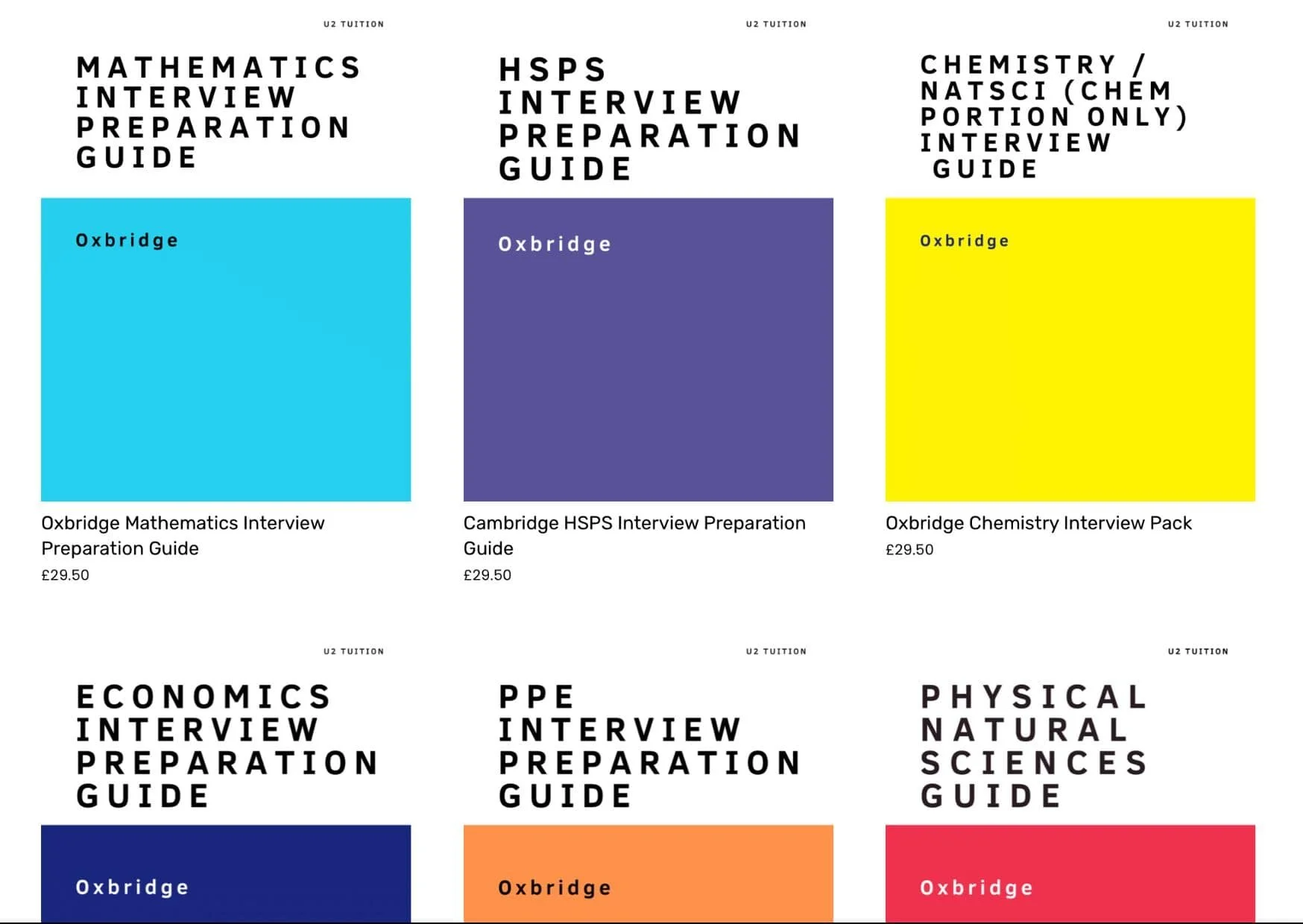A Successful Summer: Your 6-Step Guide to Acing Oxbridge Admissions
So, school has ended, and summer has begun. Want to make the most of your time by getting ahead on your UCAS application and Oxbridge prep? From crafting a standout personal statement to attending open days and tackling admissions tests, this guide is your roadmap to using your summer wisely. Whether you're targeting Oxbridge, Medicine, Law, or any competitive course, these six steps will help you build a strong application without the pressure of term-time deadlines. Optimise your six weeks of summer with these six expert tips!
1. Prepare Your Personal Statement
Your personal statement is your chance to show admissions tutors who you are beyond grades. It may seem daunting, but summer is the perfect time to get ahead.
Brainstorming your academic interests, achievements, and motivations is the best place to start. Collate and reflect on the books you've read, online courses you've taken, essay competitions, summer schools, and any relevant work experience.
Your answer to the first question, 'Why do you want to study this course or subject?', should clearly outline your passion for the subject and the spark behind your academic journey.
The second question, 'How have your qualifications and studies helped you to prepare for this course or subject?' allows you to provide further details on your study motivations by discussing school experiences and curriculum highlights.
Finally, the third question, 'What else have you done to prepare outside of education, and why are these experiences useful?' might touch on your reading, research, lectures, or even your independent projects. Reflect on these experiences to demonstrate curiosity and critical thinking.
Once you've drafted your statement, get feedback from our tutors, teachers, mentors, or family. Above all, keep it authentic; this is your story, so own it!
Check out some of our dedicated blogs for more advice about personal statement preparation.
See our complete list of personal statement blogs here.
U2 Tuition offers personalised one-to-one admissions mentoring, including expert guidance on crafting a standout personal statement. Enquire here to learn more:
2. Enhance With Extracurriculars
With fewer school commitments, summer is a great time to deepen your academic interests, develop new skills, and make your application stand out. Oxbridge admissions tutors prize intellectually curious, self-driven students who can demonstrate a genuine passion for their subject.
Summer Schools
Summer schools enable students to deepen their knowledge, explore subjects beyond the curriculum, develop critical thinking skills, stretch themselves and prepare for university applications.
It gives you rich content for your personal statement and demonstrates dedication and a proactive approach to learning, key qualities Oxbridge values.
Minds Underground Virtual Summer Schools
Our co-curricular division, Minds Underground, offers 23 subject-specific virtual summer schools, including Economics, Law, and Medicine.
Each course consists of eight 1.5-hour interactive seminars delivered by Oxbridge graduates, which offer a taster of university-level learning.
A dedicated final session for university applications, interview preparation, and a Q&A. This is led by our co-founders, both Oxbridge graduates.
Each course runs once a week over the summer, so the time commitment is manageable alongside holidays or other enrichment. Recordings and resources are available for catch-up if needed.
To view the range of courses and pricing, please see here.
Research Projects
Completing a research project demonstrates more extensive academic engagement than the average student.
Research offers an excellent opportunity to deepen your subject knowledge and to develop skills such as critical analysis and argumentation, which are key for Oxbridge interviews and future careers.
In addition to enhancing your application, a research project can help you decide whether you truly enjoy academic research, a large part of an Oxbridge degree. They also look great on your CV!
Minds Underground Research Projects
We offer guided research projects in most academic areas and career fields, whether psychology and neuroscience or international relations.
They occur over 4-5 weeks, with an hour session a week and a few hours of directed independent research.
Read more about the range of projects on offer here.
Read some previous projects here.
Clubs and Courses
With more free time than term time, summer can be the perfect time to join an academic club or enrol in a short course that aligns with your subject interests.
These clubs demonstrate that you've taken the initiative to explore your subject independently and can give you concrete examples of your subject passion to discuss in your personal statement or at an interview.
Minds Underground Clubs and Courses:
Minds Underground has a range of clubs, from the Medical Club to Debate and Law Club.
Read more about our offerings here.
These opportunities enrich your knowledge and show initiative, academic maturity, and a genuine love of learning, all qualities Oxbridge values in prospective students. Summer experiences serve as the building blocks for a compelling, well-rounded application and a confident interview performance.
For more advice about extracurriculars, check out: Our Guide to the Best Extracurricular Activities.
3. Outline Your University Options
With numerous terrific Universities and courses, deciding where and what to study can feel immensely overwhelming.
The good news is that summer offers plenty of time to consider your options, clarify your goals, and make decisions and steps towards completing your UCAS application. Use the quieter period to research and reflect on what matters to you to inform this exciting decision.
There are two key questions to answer:
Which Course?
What do you genuinely enjoy studying? Which subjects do you consistently excel in?
Think beyond your A-level syllabus. Are you drawn to abstract problem-solving, reading historical texts, writing essays, conducting experiments, or debating ethical dilemmas?
There are also specific courses that students won't have studied before, such as Biomedical Sciences or Land Economy.
Consider the academic content, assessment style (e.g. exams vs. coursework), and career prospects of the courses you're considering.
Look through course syllabi online, attend summer lectures or taster sessions, and talk to current students where possible
Read our ultimate guide about making your course choice here.
Which University?
Research different institutions to understand their teaching styles, academic focus, and campus life.
A course at one University can look very different from another, varying in modules, contact hours, and specialisms.
More specifically, these questions may help you narrow down your search:
UK or US Universities?
You can apply to universities in the UK, the US, or both, but the application processes differ.
UK universities focus heavily on academic achievement and subject-specific interests.
US institutions tend to take a broader, holistic approach. They emphasise extra-curriculars, essays, and character.
For US applications, summer is the perfect time to prepare for the SAT/ACT and to draft Common App essays.
Check out some of our US-specific guides:
Enquire here to learn more about U2 Tuition’s support for students making US & Ivy League applications.
Oxford or Cambridge?
You can only apply to Oxford or Cambridge in a single admissions cycle.
Which is right for you?
Oxford tends to favour essay-based subjects with a more traditional approach, while Cambridge often leans more towards scientific and analytical disciplines, with an emphasis on problem-solving.
Both offer excellent teaching and support across all subjects, but comparison is key as course structure can vary, as can entry requirements.
Considering Oxbridge Law? Read our article: Choosing Between Oxford vs Cambridge Law: A Comprehensive Guide'. We also have blogs on how to successfully prepare for a myriad of other degree courses here.
Which College?
Oxford and Cambridge are collegiate universities with individual colleges, each with its own culture, accommodation, tutors, and facilities.
Some colleges are large and modern, whilst others are small and historic.
They also vary in location, size, subject availability, traditions, and accommodation options.
It's important to remember that the college you apply to may not be where you end up.
You can always make an open application if you don't have a strong preference.
Having clarity over these questions will help you shape your personal statement and provide the foundation for the application process.
Attending an Open Day
Attending open days is a key way to explore whether a university fits you and learn more about a specific course. Many of these occur over the summer holidays.
You can develop a feel for the University, college (if relevant), courses, and student life.
You can speak to current students, attend sample lectures, and ask tutors about the admissions process.
Taking notes and comparing the open days you've attended is essential. Which one excited you the most? What are the subtle differences between courses and universities that could be deal-breakers?
As well as University Open Days, attend events at the specific colleges and faculties of interest.
Oxford Open Days
Cambridge Open Days
4. Ace Your Admissions Test
Once you know what course and University you're targeting, you'll see whether you need to sit an admissions test.
Summer is a great time to start practising, especially as it's quieter than term.
Early preparation can reduce test stress in the autumn term and improve your performance by establishing your areas of strength and comparative weaknesses. Gaining familiarity with the format also helps you gain confidence.
Alongside one-to-one test tutoring, U2 Tuition offers intensive summer courses. Follow the links for information about dates and pricing.
U2 Tuition Summer Courses
Tackle the TSA Course (Thinking Skills Assessment used for a wide range of courses at Oxford, such as PPE or Economics).
LNAT Course (Law National Aptitude Test)
We also have a digital LNAT Preparation Pack, available here.
Booster UCAT Course (Key if you're aiming for Medicine or Dentistry).
5. Impress at the Interview
If you submit an impressive personal statement and excel at the assessment (if applicable), you may be invited to interview.
Whilst this may seem a long way away, it's essential to consider that the interviewer will probably bring up your personal statement content, submitted work, and general subject passion and knowledge. Ensure you honestly know what you mention and submit to save yourself from stressing about it once interviews come around.
Interviews test how you think, not just what you know. The summer is the perfect time to read around your subject, deepen your knowledge, and develop skills such as critical thinking. This and interview practice will ensure you can stay calm and articulate under pressure.
Alongside one-to-one tuition, U2 Tuition has a range of resources that can help with interview preparation.
Oxbridge Mock Interview Days
These are held in November, allowing students to practice real interview scenarios and review personalised feedback.
Each student will attend three interviews, each led by a different individual from their subject, whom they haven't met before, to stimulate a real interview.
Early booking helps ensure we have ample time to organise your customised timetable.
Oxbridge Interview Packs and Guides
We offer digital interview packs and guides, tailored to Oxbridge applicants, across a range of subjects. Check them out here.
6. Stay Motivated and Organised
Although 6 weeks might seem like a long time, it'll fly by.
Make a weekly plan and set small, achievable goals to avoid feeling overwhelmed and thus risking inactivity.
Consistency is key, whether your goal is reading one new book, finishing your personal statement draft, attending an open day, or completing a mock test.
Keep track of your progress and mix up tasks to stay motivated.
Don't forget to take breaks; balance is essential, and summer is also a time to rest and recharge.
Take a look at our blog on ‘The Importance of Preparation and Time Management’ for more inspiration.
How U2 Tuition Can Help Over the Summer
At U2 Tuition, we have years of experience assisting students in successful University applications, whether for Oxbridge, Ivy League, Medicine, or something else. We are best placed to help as our Oxbridge admissions tutors, and our co-founders, have all been through the process themselves and successfully secured offers!
Let us assist you in using your summer wisely, helping set you miles ahead in the Oxbridge admissions process.
Our tutors provide comprehensive admissions support, including guidance on course selection, university choices, personal statements, admissions tests, and interview preparation.
Our tutors can complement this 6-step guide with a bespoke summer plan, expert guidance, personalised resources, and more so that you enter September confident, focused, and ready to submit a truly standout application.







